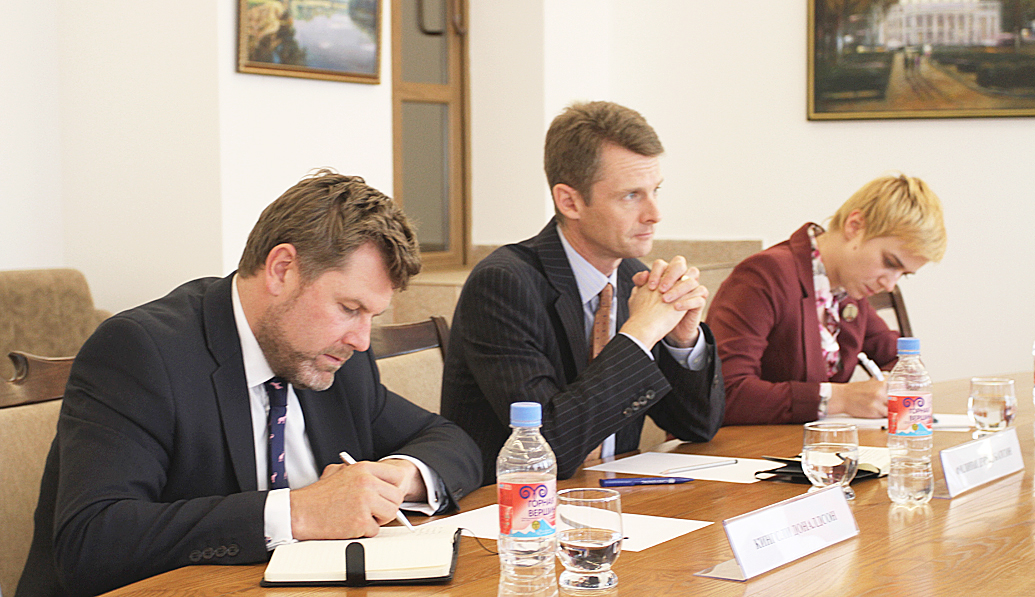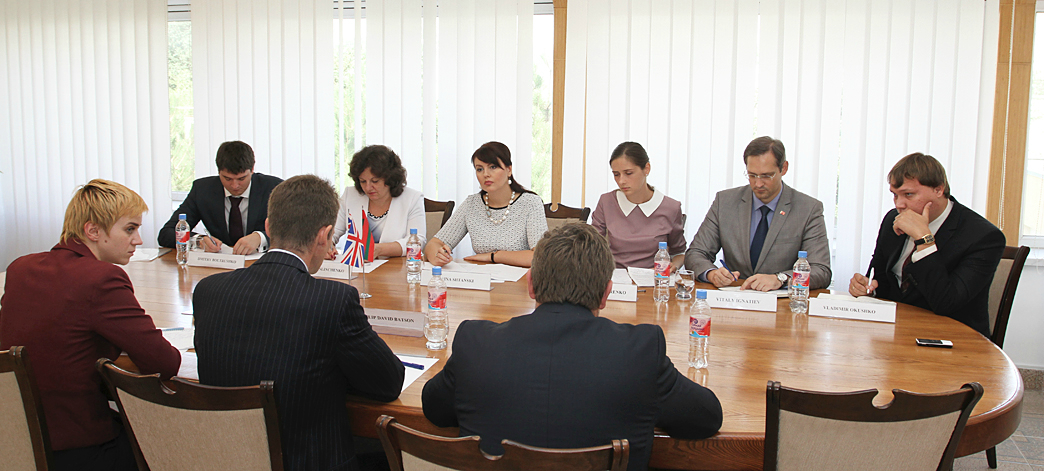Deputy Chairperson of the Government of the PMR for International Cooperation, Foreign Minister Nina Shtanski had a meeting with Her Majesty’s Ambassador Extraordinary and Plenipotentiary to the Republic of Moldova Philip Batson and Director of the Causeway Institute Kingsley Donaldson. Taking part in the meeting were Minister of Economic Development of the PMR Alevtina Slinchenko, Deputy Minister of Economic Development of the PMR Dmitry Boltrushko and Deputy Foreign Minister Vitaly Ignatiev.
The meeting discussed the situation in the negotiation process, the features of current socio-economiс position of Pridnestrovie, as well as the projects of the British Embassy implemented in Moldova and Pridnestrovie.
The sides, in particular, discussed in detail the problems of politically motivated criminal cases initiated against citizens of Pridnestrovie. Nina Shtanski noted that political representative from Moldova Victor Osipov made a number of loud statements on the readiness to solve the problem, however in practice since the beginning of 2015 more than 50 new criminal cases were initiated, and not only against government officials of Pridnestrovie, but also entrepreneurs. In addition, some individuals criminally prosecuted are wanted at the request of the Moldovan side by the International Criminal Police Organization (Interpol). The Foreign Minister draws attention of the British side to the fact that the problem which is extremely sensitive for Pridnestrovie related to the arrest and detention of the officer of the Ministry of Internal Affairs of the PMR for almost a month and a half in a Greek prison has not yet been solved.
In this regard, Nina Shtanski noted with regret that the numerous statements of Victor Osipov on his willingness to actively engage in resolving issues of criminal prosecution vary greatly depending on the audience: for external or internal recipients or for the Pridnestropvian side. But in reality there is only worsening the situation.
During the dialogue, the sides touched upon the prospects of resumption of meetings of the “5+2” permanent conference. It was noted that there is need to exclude the causes of a pause in the work of this format in order to conduct the dialogue in this format. Nina Shtanski emphasized that the Pridnestrovian side or the other one cannot have any preconditions for resumption of this work, which is clearly regulated by the document “Principles and procedures for the conduct of negotiations ...” of April 18, 2012. Meanwhile, it is obvious that the conduct of an equal political dialogue under increasing blackmail and pressure put on one of the sides is impossible and is contrary to the substance of the negotiations.
During the meeting, Minister of Economic Development of the PMR Alevtina Slinchenko informed the British side about the current economic situation in Pridnestrovie. In particular, she told about the serious decline in exports and imports of goods (by 25% and 20%, respectively). Special attention was paid to the topics of the dialogue conducted with representatives of the European Union to resolve issues related to the proposed cancellation of the regime of Autonomous Trade Preferences (ATP) since January 1, 2016 for the economic agents of the Pridnestrovian Moldavian Republic. Pridnestrovie traditionally maintains a position on this matter on the need for special conditions for trade with the EU taking into account the interests of Pridnestrovian enterprises in the context of the presence of the unresolved conflict between Moldova and Pridnestrovie.
Alevtina Slinchenko informed of the results of the study of prospects of the development of Pridnestrovian economy, conducted by specialists of the company “BerlinEconomics”. She also drew attention to the threatening data on the possible loss of 40% of turnover of the PMR after cancellation of the ATP. Along with it was also stressed that there are mutual interests in the field of trade with the EU, whereby Pridnestrovie counts on the constructive approach of the European partners in resolving this matter.
At the end of the meeting Kingsley Donaldson informed of the expert support provided by the Causeway Institute on attracting international experience to address the problem of criminal prosecution. He spoke about the solutions which had been offered to the Moldovan side during the recent visit of officials of the RM to the UK. Kingsley Donaldson also told about the readiness to share the British-Irish experience of “transitional justice” to Moldovan experts. The sides agreed to continue active cooperation on topical issues of mutual interest.









